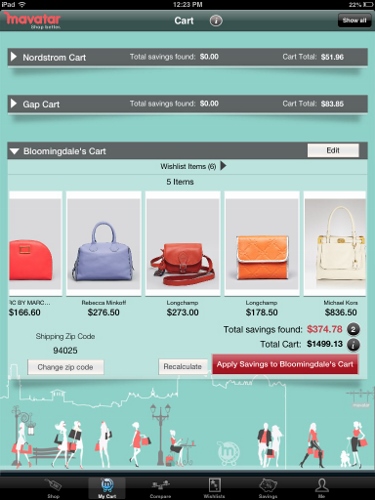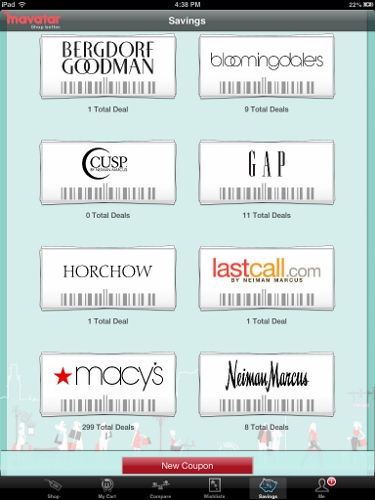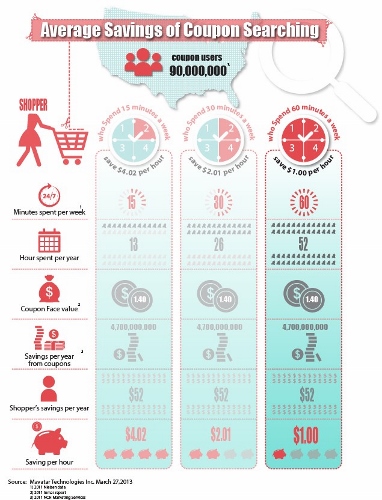
Ladies: Let's imagine you're shopping for a new pair of $1,000 Manolo Blahnik shoes, which you're treating yourself to because you normally wouldn't be able to afford them. This is a very special purchase for you. And let us also imagine you want the very best price, fit and quality of these Ferrari's of the Feet possible. (Men: Imagine the same scenario but with Bruno Magli shoes.)
As you hit all the sites on the Internet where these shoes might live, you find yourself at the online branches of Nordstrom, Bergdorf's, Saks, Neiman Marcus, Barney's (and that's just the first page of search results) as well as 800-pound gorillas, Amazon and eBay. Very quickly, you find you have more than four browser windows open with six tabs in each and your 'toggling nightmare' is just beginning. As you slowly lose your mind and the will to live, your browser crashes and you have to re-open it, go to the history page and drudge through your browsing history trying to piece together where you were and how much the multitude of sites were charging for these new fancy foot-covers. You're like a digital Sherlock Holmes searching for Moriarty.
Has this happened to anyone else but me?
Or here's another potentially negative online experience. You've finally made it through the gauntlet of online/browser sinkholes to find the shoes you must have, only to have to then engage in an online Odyssey looking for a 25 percent off digital discount coupon. After locating it, you then try to apply it to your purchase on the site you want to buy from, only to find it's not accepted. Like that crinkled five dollar bill you have to insert and then reinsert 75 times into the vending machine, the more times you try, the more times you're disappointed ... and antagonized.
Wouldn't it be great if there was a software program, website and mobile application that would consolidate all this searching, shopping, discounting headache into something more manageable? An app and website for mobile, desktop and laptop shopping with one shopping cart for all your items no matter where you're buying them? Perhaps a 'wish list' where you could store items for future purchase? And then, if only, this technology could go out scouting around the Internet for all the promo discounts and coupons that apply to your items?
Why can't there be such a consolidated shopping solution with all these modern conveniences?
Well, there is and it's called Mavatar. Short for "My Avatar," this neat shopping platform is designed sensibly as a one shopping cart solution for online shoppers who notoriously leave a massively high percentage of their cart 'abandoned' whilst they purchase elsewhere in their browser tabs. The retailers have been scratching their collective heads for decades as to why people leave their carts alone and sad; could it be because of the excruciating scenarios above?
Susan Akbarpour is the entrepreneurial and emotional spark-plug of Mavatar.

This incorrigibly active and verbal woman will happily tell you all about the Mavatar value proposition and technology infrastructure and that's if you just ask her directions on the street -- she's that switched on to easing the online shopping experience. First meeting her as she 'manned' a table at TechCrunch Disrupt New York a few months back, she immediately reeled me in with anecdotes about shopping online and how her business was designed to make it easier for humanity. "People who are shopping online want to think about their purchases, not always buy immediately," she told me stridently, "people are not optimization engines ... and Mavatar wants to make the entire shopping process easier."
Akbarpour arrived from her native Iran in 1997, already a true believer in entrepreneurship, "My father started the first ad agency in Iran more than 50 years ago," she reported proudly, "so I grew up hearing about and understanding advertising and selling products."
Arriving in America speaking very little English but plenty of Farsi, Arabic and French, Akbarpour made the $2,000 she landed with go a long way. She's the embodiment of 'The American Dream' and what is perhaps the most important component of the current immigration debate: the entrepreneurial contributions of those who come to our shores. "I'm a self-made entrepreneur, like so many others and I just knew the US was the best place for entrepreneurs," she told me.
This business-starting addiction, coupled with Akbarpour's rabid pursuit of advancing her education, may just be the golden key that so many foreign emigres use to succeed in America. "Every 10 years, I'm going back to school," Akbarpour said studiously, "I went in my 20's, 30's and to business school in my 40's," she told me then laughing charmingly, "I decided to go back to business school in a mid-life crisis revolution." Before selecting the Stanford Graduate School of Business, Akbarpour turned down the MIT and Cal Berkeley business programs.
As the quintessential woman shopper, Akbarpour sounds the battle cry for making online shopping easier and more fun for her sisters. "Most of the technologies like recommendation engines and target marketing were developed by men .. for women!!" Akbarpour points out the shrieking irony of the situation. "Women view shopping as a form of entertainment; like a game of cat-and-mouse." Speaking as a man, I feel comfortable saying that we do not view shopping as anything close to "entertainment."
And unsurprisingly, Mavatar's first target market is women shoppers. I wanted to get the independent opinion of a random woman shopper so I asked a woman I had seen around but did't know well about her online shopping habits. Laura Englander works for a NYC-based restaurant industry start-up, Culintro and shops online frequently. "If I were to buy shoes online, I would go to Zappos or Piperlime," Englander explained, "I shop about 75% online and 25% in bricks and mortar stores. I've never bought shoes or clothing from Amazon." When I asked her if she thought a one shopping cart technology would help eliminate or reduce the agony of Internet shopping, she responded with a somewhat bemused, "yes."
Though I can't remember the last time I was in the market for a pair of $1,000 Bruno Magli shoes (uh, never), I've witnessed that Mavatar and the convenience of its 'universal shopping cart' makes it easier for me to zoom through my perceived drudgery of having to shop online.

In addition to the universal shopping cart innovation pictured above, Mavatar has also eased the burden of comparison shopping to the point where it consolidates all the items from a multitude of online retail sources.


And then there's the "Wish List" function, great for eyeing/saving merchandise and its pricing or birthdays, Father's/Mother's Day, etc.

And the final coup de grace: the automated, lightning-fast coupon Net scourer which uses advanced software algorithms to find the hardest-to-find digital coupons and promotion codes--so you don't have to.

Resulting in the much-desired savings ... "Nobody Wants To Pay Retail."

Brom Mahbod is a top IT executive with more than 20 years under his belt at Oracle and before that five years at H-P Labs. He is co-founder and CEO of Mavatar.

He is a very different personality from Susan Akbarpour and it seems they compliment each other beautifully. Mahbod has a Ph.D. in Computer Networks and has been involved in some of the seminal technology innovation at both H-P and Oracle. "I'm a driver and analytical guy," Mahbod told me when asked how he would describe himself, "analytical guys find solutions to problems."
If there's something to be known about computers and how they connect, Mahbod probably knows it ... cold. At H-P Labs, Mahbod worked on OpenView which was an early network systems management product. Eventually, Mahbod moved within H-P to the database group but told me that "it didn't really feel like pure research and it didn't really feel like industry." So he decided to make a move.
Quite naturally given Mahbod's recent database experience, he accepted a position with Oracle, the predominant database company. The year was 1989.
At Oracle, Mahbod worked for some time in the Network Computer, Inc. spin-off of Oracle which was a great, advanced initiative which Mahbod says "was way ahead of its time." I agree.
As if being involved in Network Computer wasn't enough, Mahbod then began a project that would lead to one of the most active, exciting technology sectors of today: Conceiving and building the "Cloud" or as Mahbod put it, "I was responsible for the architecture of the 'private cloud.'"
While at Oracle, Mahbod was approached by Susan Akbarpour and asked to join the board of one of her earlier start-ups.
After 20 years at Oracle, Mahbod left as a super-young 'retiree.' For several months, he relaxed, spent time with family and gave a lot of thought about what he wanted to do.
"My son was taking the PSATs and I was looking around online," Mahbod began talking about what begat Mavatar, "and I found a $50 discount coupon for the PSATs. That felt great. Then, I was buying him a handful of text books which came to $1,200. After six or seven hours during two different sessions of searching, I found discounts and coupons that brought it down to $680 for the same books." This is one of the big experiences that prepared Mahbod for the call that would come from Akbarpour a few months later.
The graphic below shows the results of Akbarpour's exhaustive research into online coupons and shoppers quest for them that spawned Mavatar and brought Mahbod onboard.

While Mavatar started out primed for the iPad (download the free iPad app at the iTunes app store here), Safari and Mozilla Firefox browser, their Chrome browser app comes out next week and their Android app is slated for launch by summer's end. A recent "Daily App Show" review highlighted Mavatar's strengths.
Akbarpour, Mahbod and their Mavatar team have created a fun brand with a contrarian-shaped, big, red M shopping cart as their logo as well as "The Story of Ashley" in which Ashley closely resembles many of us as we stumble around online where shopping is supposed to be so much easier, only to find that -- dammit -- it's sometimes easier to just go out and buy the item in a store.
These two efficient entrepreneurs have also put together a top-notch "Board of Advisors" including Chris Kelly, the former Chief Privacy Officer (CPO) of Facebook; Mitch Stein, a former Apple director who coined the omnipresent term, "user experience;" and Phil Schlein, CEO of Macy's California for more than a decade, and "knows a little bit about consumer shopping." Some of these advisors are also early investors in a Mavatar seed round.
As a current "Senior Advisor" at US Venture Partners, Phil Schlein has spent more than 28 years as a venture capitalist and angel investing in different start-ups. "I help young companies get started particularly in the consumer world," Schlein said. "Mavatar makes it an organized buying experience instead of a chaotic one. With its 'Wish List' and ability to remember birthdays, anniversaries and the like, Mavatar is a significant application initially for women shoppers." When I asked about what Schlein might think lies ahead for Mavatar's future, he didn't miss a beat, "Mavatar could very well be acquired by a company that does significant business with consumers." Hmmm ... Amazon, are you listening?
Jillian Manus is well-qualified to discuss empowering and inspiring women, having helped Maria Shriver build "The Women's Conference." Akbarpour heard Manus speak at this conference and connected with her there. Manus and Akbarpour are both highly-evolved Alpha women. Manus told me that "my companies like, Manus & Associates Literary Agency are fueling my foundation which creates self-sufficiency for women and children." Manus is fascinated by Mavatar. "It's interesting because you now have Mavatar which I think will influence how women shop. Human behavior is often about optimizing ... everything really ... time -- the most valuable thing we have; optimizing value and saving money too." What about the difference between women and men when it comes to shopping dynamics? "Women are multi-taskers while men are more linear," Manus observed, "Women are like Ninjas of shopping -- we shop for everybody. Men are like the Masai."
Brom Mahbod asserted, "There are occasionally foundational technologies in start-ups but then you see companies that are one-trick ponies and they can't get past that one thing. The beauty of Mavatar it that it's a one-stop shop--it's a virtual mall--where you can find and compare purchases; save things for later; make a wish list; find coupons and savings and most important of all, do unexpected things."
Mavatar is currently looking for what Akbarpour termed "a big round Series A" investment and already has major retailers such as Macy's, Nordstrom, Neiman Marcus, Bergdorf Goodman, GAP, Old Navy, Banana Republic, Piperlime and others on their platform. "We've validated our value proposition, user acquisition strategy and technology infrastructure and in our first recent SEM campaign, experienced a 30 percent conversion rate from click-through to install," Akbarpour told me as if she were speaking to a VC. "We are the only start-up company in history with revenue before launching a product," she beamed.

